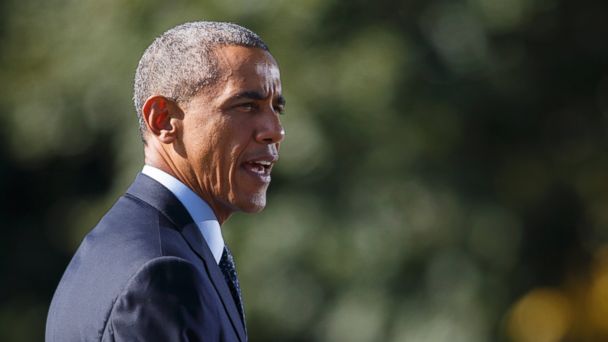Today is the First Time Obama Has Said the Word 'Khorasan' in Public

J. Scott Applewhite / AP Photo
ANALYSIS:
Today is the first time President Obama has uttered the word "Khorasan" in public.
Indeed, we can find no example of any White House official ever mentioning this al Qaeda cell by name in public. The group has never even been mentioned in any of the White House background briefings on the terrorist threat emanating from Syria (and there have been several such briefings).
It's quite extraordinary to see military action against a group the White House has never talked about.
New ISIS Recording Urges Muslims to Kill Civilians in US-Led Coalition Countries
Airstrikes 'Successful' Against ISIS Targets in Syria, US Military Says
President Obama Says Airstrikes Against ISIS Targets in Syria 'Not America's Fight Alone'
There is one official outside the White House who did talk about Khorasan, briefly, last week. James Clapper had this to say Thursday at an intelligence conference in Washington: "In terms of threat to the homeland, Khorasan may pose as much of a danger as the Islamic State."
Clapper, the U.S. Director of National Intelligence, may have revealed more than the administration wanted to reveal. The White House was trying to keep this quiet to avoid tipping the group off that it might be targeted. On the same day Clapper mentioned Khorasan, White House Press Secretary Josh Earnest was directly asked about the group at a White House press briefing and declined to comment. Here's the exchange:
QUESTION: OK. I wanted to ask you about … a threat that I'm curious if the president has been briefed on, and to what degree he is knowledgeable about it. It's a group that is related to al Qaeda called Khorasan. And we have reported that in dozens of airports, U.S.-bound passengers are undergoing enhanced screening. Security agents are looking for hidden explosives, uncharged laptops and phones are banned from flights because this particular group is trying to create an even more sophisticated way to smuggle explosives on planes. And this could be a more immediate threat than what is currently dominating a tremendous amount of policy and headlines, meaning ISIL or ISIS. Can you tell us anything about what the president knows about this, the degree to which his counterterrorism officials are on this?
EARNEST: You're asking me about an intelligence issue, obviously, so there is - I'm limited in what I can say. But what I can tell you is that our intelligence professionals have long spoken about the host of terror threats that are emanating from Syria. You've also heard me discuss quite a bit about the challenges posed by foreign terrorist fighters. And next week you will hear directly from the president when he chairs a U.N. Security Council session on this very topic.
At the same time, I'm not in a position to provide granular detail from here about specific threats or potential cells that may be operating and seeking to carry out attacks against American interests. Frankly, doing so would be counterproductive to our whole-of-government approach to countering this challenge.
Let me just add to that by saying, generally, that the Obama administration and our law enforcement and national security professionals remain vigilant about threats that are emanating from Syria and other places around the globe. And this requires the constant evaluation of our security posture. It often will require the tweaking of our security posture to change certain elements in a way that would strengthen our defenses in one area.
And sometimes these changes to our homeland security posture are pretty evident to the traveling public, and sometimes they aren't. But we remain vigilant about the threats that continue to emanate from al Qaeda and their affiliates all around the globe.